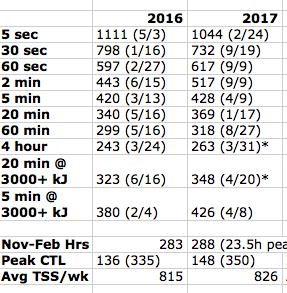Running Away From Cycling
/Running and cycling, two sports with a lot of similarities, and even in triathlon – two sports that people train for concurrently. However, there are also big differences. On a simple level – and being FAR from an expert – I think when we look at running next to cycling, with regards to metabolics, oxygen demand, and HR response, we see super similar figures and demands. Where the sports start to diverge in demands is the mechanics. Without going down too much of a rabbit hole, on a bike the athlete is limited by oxygen uptake and transport largely, with the bike taking care of the mechanics. However, running, athletes can have super different economies (how fast they can go for their internal effort), based on the mechanics of the body (tendon stiffness, technique, etc). I’d say those differences are simplified in general, and that I am far from an authority to talk on this topic.
Read More

















